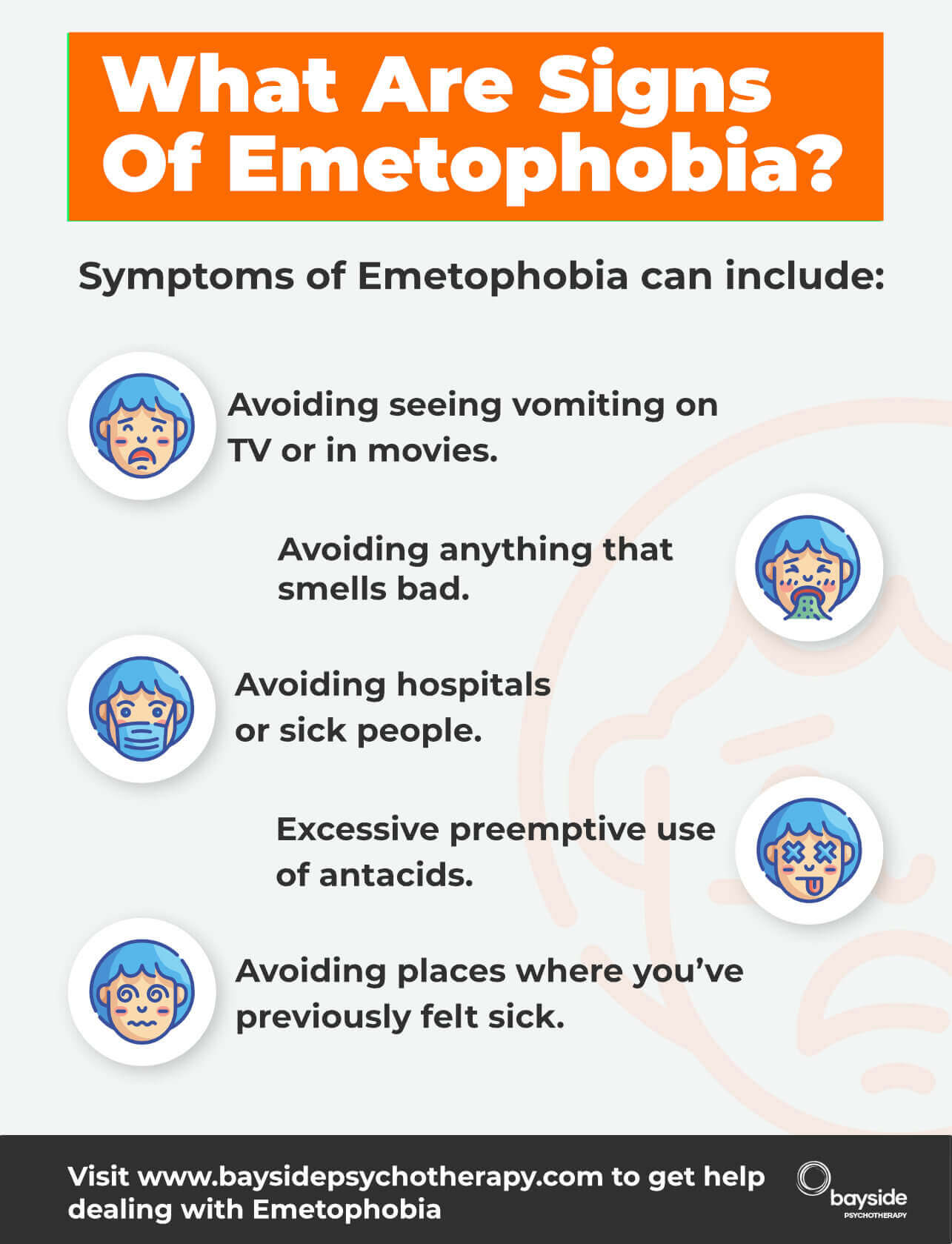
Does the thought of vomiting—or even hearing the word—send your heart racing? At Bayside Psychotherapy, we get it. Emetophobia, the intense fear of being sick, isn’t just discomfort—it’s a daily battle that reduces your world. Avoiding friends, skipping events, or dodging doctors because of ‘what if’ fears can leave you restricted, isolated and stuck.
Our qualified therapists, trained to AHA and AASW standards (depending on the therapist), offer personalised hypnotherapy, counselling, and psychotherapy support in Highett (15 minutes from Melbourne CBD with free parking) or online across Australia. You don’t have to face this alone—let’s find what works for you.
Get matched with a therapist:

What Is Emetophobia and How Does It Affect You?
Emetophobia, or Specific Phobia of Vomiting (SPOV), is more than a dislike—it’s a specific anxiety disorder impacting around 8.8% of women and 1.7% of men. It’s your mind’s alarm going off at the idea of vomit. You might feel nausea, dizziness, or panic just thinking about it—let alone seeing others that may be sick. Daily life suffers. Skipping social plans, obsessing over food safety, or avoiding kids’ parties are common. But relief can be possible with the right approach and dedication.
Causes of Emetophobia are variable according to the individual, for example:
It might start with a bad memory—vomiting publicly or a brutal stomach bug. But not always. Research suggests it can stem from anxiety loops, genetics, or symbolic fears (e.g., losing control). Triggers like motion sickness or food intolerance can amplify it. We’ll aim to help you untangle the ‘why’ and move forward.

Signs You Might Have Emetophobia
Symptoms of Emetophobia can include:
- Avoiding seeing vomiting on TV or in movies.
- Obsessing over food and meal plans.
- Avoiding all bad-smelling things excessively.
- Avoiding hospitals or potentially sick people.
- Difficulties describing or hearing the word “vomit”.
- Excessive pre-emptive use of antacids.
- Avoiding places where you’ve felt sick.
Spot these? You’re not alone: Avoiding vomit in media. Over-checking food expiry. Dodging hospitals or potentially sick people. Gagging at the word ‘vomit’. Overusing antacids ‘just in case’. Skipping places tied to past nausea. These habits shrink your life—but they don’t have to define it anymore.

Treating Emetophobia – Tips To Overcome The Fear Of Throwing Up
Picture a safe, quiet spot—like a still beach—for 2 minutes, breathing slow and deep. Before approaching a challenging environment. It’s not therapy, but it mimics hypnosis’s calm focus, potentially cutting stress 20% per studies. For more, grab our $19.95 Emetophobia MP3—refundable if it doesn’t help.*
- Don’t under or over expose yourself. Avoidance gives fear more power over you, but overwhelming yourself with too much exposure too soon may exacerbate the phobia.
- Find an exposure balance in getting acquainted with your emetophobia by educating yourself about it first.
- Practice mindfulness skills in which you observe your emotions without trying to fix or get rid of them.
- Be non-judgemental and reflective rather than self-critical (challenge irrational, negative thoughts that undermine your confidence).
- Build a positive support network.
- Seek professional assistance from a psychotherapist to help you to unearth the symbolic meaning of the vomit phobia and resolve inner conflicts that led to its formation.
Need emetophobia therapy?
Book an appointment
Ready to stop avoiding and start living? Book a session in Highett or online
Call Bayside Psychotherapy on (03) 9557 9113 if you have questions. Your call is completely confidential, and there’s absolutely no obligation.
You can also book an appointment by using our online booking form for online appointments. Or, if you prefer, you can book an in-clinic session.
Treating Emetophobia
- Seek professional assistance.
- Mindfully aim for curiosity rather than self criticism. This phobia is not uncommon and help exists;
- Practice mindfulness skills or similar meditative techniques.
- Decide if you want hypnotherapy, counselling or depth psychotherapy.
- Check out this comprehensive guide on how to choose a therapist.
- Find a therapist matched to your requirements for Emetophobia help:

What Is The Cause Of Emetophobia?
Many cases of emetophobia happen after a negative experience with vomiting, though not always! For example, you might develop emetophobia if you vomited in public or in front of someone else, had an illness (like the stomach flu, food poisoning or alcohol poisoning) that caused a lot of vomiting. However, in many cases vomit is symbolic of something else that needs to be addressed.
Can You Self Diagnose Emetophobia?
Emetophobia is identified as a specific phobia when the dread of vomiting leads to persistent, excessive anxiety that greatly affects one’s daily life. However always seek professional assistance rather than attempting self diagnosis or management alone.
Meet Our Therapists
-
-
-
Adam Szmerling: Psychoanalytic Psychotherapist—digs into phobia’s origins with deep insight.
-
Lawrence Akers: Clinical Hypnotherapist—eases panic with proven techniques.
-
Carolina Rosa: Counsellor & Hypnotherapist—builds calm through tailored support.
-
Sara Herring: Hypnotherapist—targets SPOV triggers effectively.
-
Humaira Ansari: NLP & Hypnotherapist—rewires thought patterns for lasting change.
Our team brings diverse, professional expertise to help you overcome emetophobia—skilled, trusted, and ready to support you: Get matched.
-
-
Note: Whilst we will do our best to assist you, we rely on our clients’ full commitment to and participation in the treatment process to optimise results. Although some of our therapists work with people presenting with this condition, no guarantees of any outcomes can be made.
Reception Phone Hours
- Monday 8:30am to 5:30pm
- Tuesday 8:30am to 5:30pm
- Wednesday 8:30am to 5:30pm
- Thursday 8:30am to 5:30pm
- Friday 8:30am to 5:30pm
Closed on public holidays
Choose your own date and time for an online or in-clinic session
Therapist Hours
- Monday 8:00am to 8:00pm
- Tuesday 8:30am to 8:00pm
- Wednesday 8:30am to 8:00pm
- Thursday 8:30am to 8:00pm
- Friday 8:30am to 8:00pm
- Saturday 8:00am to 6:00pm
Closed on public holidays








